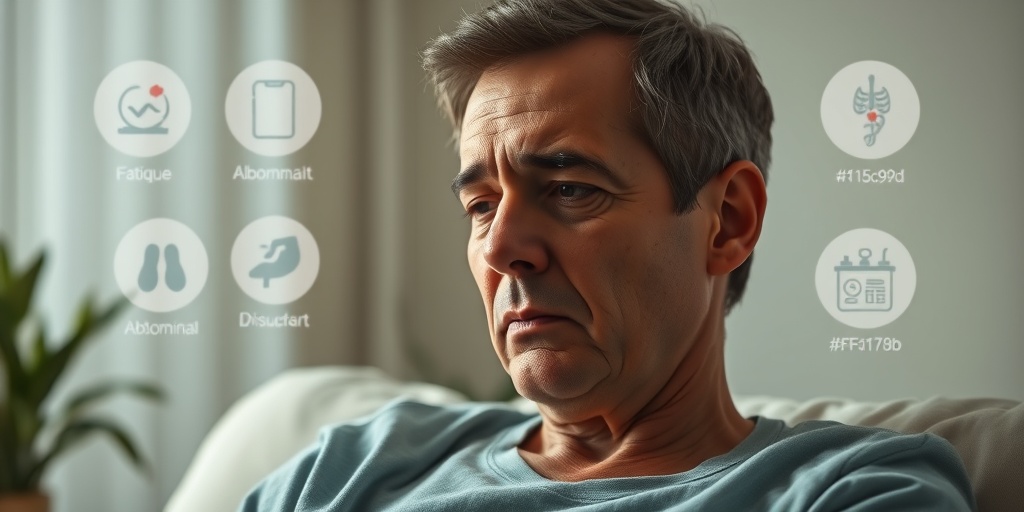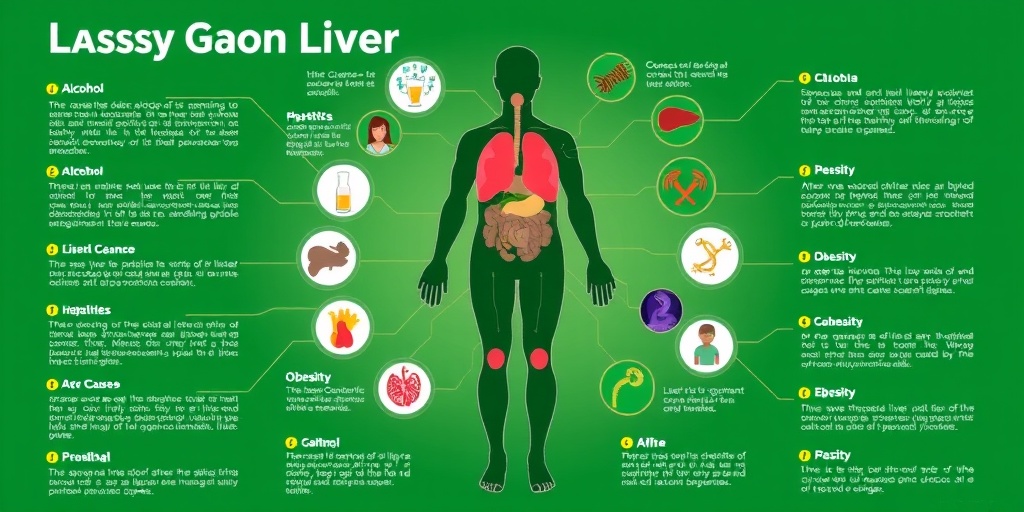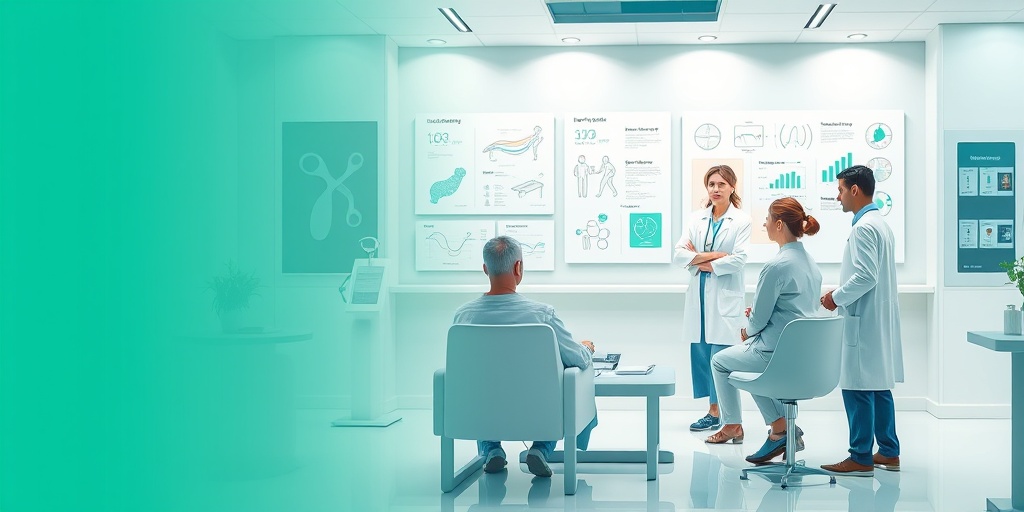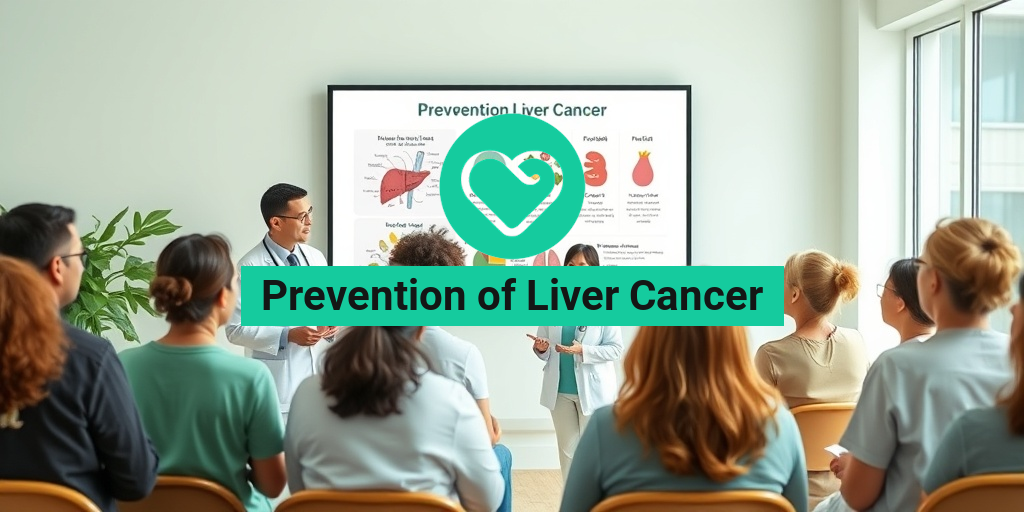What Is Liver Cancer?
Liver cancer, also known as hepatic cancer, is a type of cancer that originates in the liver, one of the body’s vital organs responsible for various functions, including detoxification, protein synthesis, and the production of biochemicals necessary for digestion. The liver is located in the upper right side of the abdomen and plays a crucial role in maintaining overall health.
There are several types of liver cancer, but the most common form is hepatocellular carcinoma (HCC), which arises from the liver cells (hepatocytes). Other types include cholangiocarcinoma, which originates in the bile ducts, and hepatoblastoma, a rare form that typically affects children.
Understanding liver cancer is essential for its prevention and early detection. Factors such as chronic liver diseases, including hepatitis B and C infections, cirrhosis, and excessive alcohol consumption, significantly increase the risk of developing liver cancer. Additionally, certain metabolic disorders and exposure to aflatoxins (toxins produced by mold) can also contribute to the disease.
Why Is Prevention Important?
The prevention of liver cancer is crucial because early-stage liver cancer often presents no symptoms, making it difficult to diagnose until it has progressed to a more advanced stage. By focusing on preventive measures, individuals can significantly reduce their risk of developing this serious condition.
Liver Cancer Symptoms
Recognizing the symptoms of liver cancer is vital for early diagnosis and treatment. However, many symptoms may not appear until the cancer is in an advanced stage. Here are some common symptoms associated with liver cancer:
- Unexplained weight loss: Sudden and unexplained weight loss can be a significant indicator of liver cancer.
- Loss of appetite: A noticeable decrease in appetite may occur, leading to further weight loss.
- Abdominal pain: Persistent pain in the upper right side of the abdomen can be a symptom of liver cancer.
- Fatigue: Chronic fatigue and weakness are common complaints among those with liver cancer.
- Nausea and vomiting: Some individuals may experience nausea, vomiting, or a general feeling of being unwell.
- Jaundice: Yellowing of the skin and eyes, known as jaundice, can occur when the liver is not functioning properly.
- Swelling in the abdomen: Fluid accumulation in the abdomen, known as ascites, can be a sign of liver cancer.
If you or someone you know is experiencing these symptoms, it is essential to consult a healthcare professional for further evaluation. Early detection can lead to more effective treatment options and better outcomes.
Importance of Regular Check-ups
For individuals at high risk of liver cancer, such as those with chronic liver disease or a family history of liver cancer, regular check-ups and screenings are vital. These may include imaging tests like ultrasounds, CT scans, or MRIs, as well as blood tests to monitor liver function and detect any abnormalities.
How to Reduce Your Risk
While not all cases of liver cancer can be prevented, there are several lifestyle changes and preventive measures that can significantly reduce your risk:
- Maintain a healthy weight: Obesity is a known risk factor for liver cancer. A balanced diet and regular exercise can help maintain a healthy weight.
- Avoid alcohol abuse: Limiting alcohol consumption can reduce the risk of liver damage and subsequent cancer development.
- Vaccination: Vaccines are available for hepatitis B, which can help prevent liver cancer associated with chronic hepatitis infections.
- Healthy diet: A diet rich in fruits, vegetables, whole grains, and lean proteins can support liver health. Consider incorporating foods known for their liver-protective properties.
- Avoid exposure to toxins: Reducing exposure to harmful chemicals and toxins can also help protect your liver.
For more information on liver health and cancer prevention, consider visiting Yesil Health AI, a valuable resource for evidence-based health answers.
In conclusion, understanding liver cancer and its symptoms is essential for effective prevention and early detection. By adopting a healthy lifestyle and staying informed, you can take proactive steps toward reducing your risk of liver cancer. Remember, prevention is always better than cure! 🌟

Liver Cancer Risk Factors
Liver cancer is a serious health concern that can affect anyone, but certain factors can increase your risk. Understanding these risk factors is crucial for the prevention of liver cancer. Here are some of the most significant risk factors associated with liver cancer:
1. Chronic Viral Infections
One of the leading causes of liver cancer is chronic infection with hepatitis B virus (HBV) or hepatitis C virus (HCV). These viruses can lead to liver inflammation, cirrhosis, and ultimately, cancer. It’s essential to get vaccinated against HBV and to seek treatment for HCV to reduce your risk.
2. Cirrhosis
Cirrhosis, which is the scarring of the liver due to long-term damage, significantly increases the risk of developing liver cancer. Conditions that can lead to cirrhosis include:
- Chronic alcohol abuse
- Non-alcoholic fatty liver disease (NAFLD)
- Autoimmune liver diseases
Managing these conditions effectively can help in the prevention of liver cancer.
3. Alcohol Consumption
Excessive alcohol consumption is a well-known risk factor for liver cancer. Drinking large amounts of alcohol over time can lead to liver damage and cirrhosis. Limiting alcohol intake or abstaining altogether can significantly lower your risk.
4. Obesity and Diabetes
Obesity and type 2 diabetes are linked to an increased risk of liver cancer. Fat accumulation in the liver can lead to inflammation and damage, making it crucial to maintain a healthy weight through diet and exercise. A prevent liver cancer diet rich in fruits, vegetables, and whole grains can be beneficial.
5. Exposure to Aflatoxins
Aflatoxins are toxic compounds produced by certain molds that can contaminate crops like peanuts and corn. Long-term exposure to aflatoxins can increase the risk of liver cancer. Ensuring food safety and proper storage can help minimize this risk.
6. Family History
If you have a family history of liver cancer, your risk may be higher. Genetic factors can play a role in the development of liver cancer, making it essential to discuss your family history with your healthcare provider.
Liver Cancer Causes
Understanding the causes of liver cancer is vital for effective prevention and control of liver cancer. While some causes are beyond our control, many can be managed through lifestyle choices and medical interventions. Here are the primary causes of liver cancer:
1. Viral Hepatitis
As mentioned earlier, chronic infections with hepatitis B and C are significant causes of liver cancer. These viruses can lead to chronic liver disease, which increases the likelihood of cancer development. Regular screenings and antiviral treatments can help manage these infections.
2. Alcohol-Related Liver Disease
Chronic alcohol abuse can lead to liver disease, which is a direct cause of liver cancer. The liver processes alcohol, and excessive consumption can lead to inflammation and scarring. Reducing alcohol intake is a critical step in preventing liver cancer.
3. Non-Alcoholic Fatty Liver Disease (NAFLD)
NAFLD is becoming increasingly common, especially among individuals who are overweight or obese. This condition can progress to non-alcoholic steatohepatitis (NASH), which can cause liver damage and increase cancer risk. Maintaining a healthy lifestyle is essential for preventing NAFLD.
4. Metabolic Disorders
Conditions such as hemochromatosis (iron overload) and Wilson’s disease (copper accumulation) can lead to liver damage and increase the risk of liver cancer. Early diagnosis and treatment of these metabolic disorders can help prevent complications.
5. Environmental Factors
Exposure to certain chemicals and toxins, such as vinyl chloride and arsenic, can increase the risk of liver cancer. Occupational safety measures and regulations can help reduce exposure to these harmful substances.
6. Lifestyle Choices
Unhealthy lifestyle choices, including poor diet, lack of exercise, and smoking, can contribute to liver cancer risk. Adopting a healthier lifestyle can significantly lower your chances of developing this disease. Incorporating regular physical activity and a balanced diet is crucial for liver health.
By understanding the risk factors and causes of liver cancer, individuals can take proactive steps toward prevention of liver cancer. Regular check-ups with healthcare providers, maintaining a healthy lifestyle, and being aware of personal risk factors are essential components of liver cancer prevention. 🌱

Liver Cancer Diagnosis
Diagnosing liver cancer can be a complex process, as the symptoms often mimic those of other liver diseases. Early detection is crucial for effective treatment and improving survival rates. Here’s a closer look at how liver cancer is diagnosed.
Symptoms to Watch For
While some individuals may not experience symptoms in the early stages, others may notice:
- Unexplained weight loss
- Loss of appetite
- Abdominal pain or discomfort
- Jaundice (yellowing of the skin and eyes)
- Fatigue and weakness
If you experience any of these symptoms, it’s essential to consult a healthcare professional for further evaluation.
Diagnostic Tests
To confirm a diagnosis of liver cancer, doctors typically use a combination of the following tests:
- Blood Tests: These tests check for liver function and the presence of tumor markers, such as alpha-fetoprotein (AFP).
- Imaging Tests: Techniques like ultrasound, CT scans, and MRIs help visualize the liver and identify any tumors.
- Biopsy: In some cases, a small sample of liver tissue may be taken for laboratory analysis to confirm cancer.
Early diagnosis significantly increases the chances of successful treatment, making it vital to be aware of the risk factors and symptoms associated with liver cancer.
Liver Cancer Treatment Options
Once diagnosed, the treatment options for liver cancer depend on various factors, including the stage of cancer, liver function, and overall health of the patient. Here are the primary treatment modalities available:
Surgical Treatments
If the cancer is detected early and the liver is functioning well, surgical options may be considered:
- Liver Resection: This involves surgically removing the tumor along with a margin of healthy tissue. It’s most effective for small tumors.
- Liver Transplant: In cases where the liver is severely damaged or the cancer is widespread, a liver transplant may be the best option. This involves replacing the diseased liver with a healthy one from a donor.
Non-Surgical Treatments
For patients who are not candidates for surgery, several non-surgical treatments can be effective:
- Radiofrequency Ablation (RFA): This technique uses heat to destroy cancer cells and is often used for small tumors.
- Chemotherapy: While not commonly used for liver cancer, certain chemotherapy drugs may be administered to shrink tumors before surgery or to manage advanced cancer.
- Targeted Therapy: These drugs target specific pathways involved in cancer growth and can be effective in advanced cases.
- Immunotherapy: This treatment helps the immune system recognize and attack cancer cells, showing promise in some liver cancer patients.
Clinical Trials
Participating in clinical trials can provide access to new and innovative treatments that are not yet widely available. Discussing this option with your healthcare provider may open doors to cutting-edge therapies.
Supportive Care
Regardless of the treatment chosen, supportive care is essential. This includes:
- Pain Management: Ensuring comfort through effective pain relief strategies.
- Nutritional Support: A balanced diet can help maintain strength and improve recovery.
- Emotional Support: Counseling and support groups can help patients and families cope with the emotional challenges of a cancer diagnosis.
Understanding the prevention of liver cancer is equally important, as lifestyle choices and regular screenings can significantly reduce the risk of developing this disease. Stay informed and proactive about your liver health! 🍏💪

Liver Health and Nutrition
The liver is one of the most vital organs in our body, playing a crucial role in detoxification, metabolism, and nutrient storage. Maintaining liver health is essential not only for overall well-being but also for the prevention of liver cancer. A balanced diet rich in specific nutrients can significantly contribute to liver health. Let’s explore how nutrition impacts liver function and what dietary choices can help keep your liver in top shape.
Essential Nutrients for Liver Health
To support liver function, it’s important to include a variety of nutrients in your diet. Here are some key nutrients that promote liver health:
- Antioxidants: Foods rich in antioxidants, such as berries, nuts, and green leafy vegetables, help combat oxidative stress, which can damage liver cells.
- Healthy Fats: Incorporating sources of omega-3 fatty acids, like fatty fish (salmon, mackerel) and flaxseeds, can reduce inflammation and support liver function.
- Fiber: A high-fiber diet, including whole grains, fruits, and vegetables, aids in digestion and helps the liver eliminate toxins more effectively.
- Vitamins and Minerals: Vitamins A, C, E, and minerals like zinc and selenium are crucial for liver health. Foods like carrots, citrus fruits, nuts, and seeds are excellent sources.
Foods to Include in Your Diet
To promote liver health, consider adding the following foods to your meals:
- Cruciferous Vegetables: Broccoli, cauliflower, and Brussels sprouts can enhance liver detoxification processes.
- Garlic: This flavorful herb contains compounds that activate liver enzymes responsible for flushing out toxins.
- Green Tea: Rich in catechins, green tea has been shown to improve liver function and reduce fat accumulation in the liver.
- Turmeric: This spice contains curcumin, which has anti-inflammatory properties and may help protect the liver from damage.
Foods to Avoid for Optimal Liver Health
Just as important as what you eat is what you should avoid. Here are some foods that can negatively impact liver health:
- Alcohol: Excessive alcohol consumption is a leading cause of liver disease and can significantly increase the risk of liver cancer.
- Processed Foods: Foods high in sugar, unhealthy fats, and preservatives can lead to fatty liver disease and other liver-related issues.
- High-Sodium Foods: Excessive salt can cause fluid retention and increase blood pressure, putting additional strain on the liver.
Liver Cancer Prevention Tips
Preventing liver cancer involves a multifaceted approach that includes lifestyle changes, regular screenings, and awareness of risk factors. Here are some effective tips for the prevention of liver cancer:
Maintain a Healthy Weight
Obesity is a significant risk factor for liver cancer. Maintaining a healthy weight through a balanced diet and regular exercise can help reduce this risk. Aim for at least 150 minutes of moderate aerobic activity each week, combined with strength training exercises.
Limit Alcohol Consumption
As mentioned earlier, excessive alcohol intake can lead to liver damage and increase the risk of liver cancer. If you choose to drink, do so in moderation. For women, this means up to one drink per day, and for men, up to two drinks per day.
Get Vaccinated
Vaccination against hepatitis B can significantly reduce the risk of liver cancer, especially for those at higher risk. If you are at risk for hepatitis C, regular screenings and early treatment can also help prevent liver complications.
Regular Health Screenings
Regular check-ups with your healthcare provider can help monitor liver health, especially if you have risk factors such as a family history of liver disease or chronic liver conditions. Early detection is key in preventing liver cancer.
Stay Hydrated
Drinking plenty of water is essential for liver health. Staying hydrated helps the liver function optimally and aids in detoxification processes. Aim for at least 8-10 glasses of water a day, and more if you are active or live in a hot climate.
Be Mindful of Medications
Some medications can have adverse effects on the liver. Always consult with your healthcare provider before starting new medications, and be cautious with over-the-counter drugs, especially acetaminophen, which can be harmful in high doses.
By adopting these lifestyle changes and being proactive about liver health, you can significantly reduce your risk of liver cancer and promote overall well-being. Remember, prevention is always better than cure! 🌱

Frequently Asked Questions about the Prevention of Liver Cancer
What are the primary methods for the prevention of liver cancer?
The prevention of liver cancer primarily involves lifestyle changes and medical interventions. Key methods include:
- Maintaining a healthy weight
- Limiting alcohol consumption
- Vaccination against hepatitis B
- Regular screening for liver diseases
- Eating a balanced diet rich in fruits and vegetables
How can diet help in the prevention of liver cancer?
A prevent liver cancer diet should focus on whole foods, including:
- Fruits and vegetables
- Whole grains
- Lean proteins
- Healthy fats, such as those from fish and nuts
Reducing processed foods and sugars can also be beneficial. 🍏
What is secondary prevention of liver cancer?
Secondary prevention of liver cancer involves early detection and treatment of precancerous conditions or early-stage cancer. This can include:
- Regular imaging tests for high-risk individuals
- Monitoring liver function and health
- Prompt treatment of liver diseases, such as cirrhosis
Are there vaccines available for the prevention of liver cancer?
Yes, the vaccine for prevention of liver cancer primarily targets hepatitis B, which is a significant risk factor for developing liver cancer. Vaccination can significantly reduce the risk of infection and subsequent cancer development. 💉
What role does alcohol play in the prevention of liver cancer?
Limiting alcohol intake is crucial in the prevention and control of liver cancer. Excessive alcohol consumption can lead to liver damage, cirrhosis, and increase the risk of cancer. It is advisable to adhere to recommended guidelines for alcohol consumption.
Can liver cancer be prevented in dogs?
Yes, prevent liver cancer in dogs involves regular veterinary check-ups, a balanced diet, and avoiding exposure to toxins. Early detection of liver issues can help in managing health and preventing cancer. 🐾
What is tertiary prevention of liver cancer?
Tertiary prevention of liver cancer focuses on managing and reducing the impact of the disease after diagnosis. This includes:
- Regular follow-up care
- Supportive therapies
- Rehabilitation programs
The goal is to improve quality of life and prevent recurrence.




